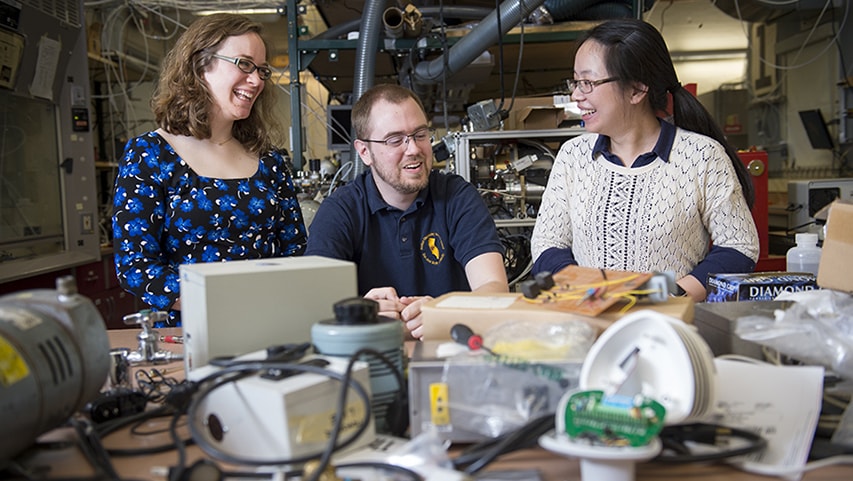Students Invited to Meeting with 31 Nobel Laureates
By Emily Payne

Mellon College of Science graduate students Krista Freeman, Michael Polen and Chenjie Zeng talk about the Lindau Nobel Laureate Meeting.
Carnegie Mellon University graduate students Michael Polen and Chenjie Zeng will be among 400 young scientists from 76 countries who will join 31 Nobel Laureates in Lindau, Germany, June 25-30.
The annual Lindau Nobel Laureate Meeting alternates between the natural science Nobel Prize disciplines — physiology and medicine, physics and chemistry — with an interdisciplinary meeting of all three disciplines every five years.
Topics at this year's gathering, dedicated to chemistry, will focus on molecular machines, big data, climate change and the role of science in a "post-truth" era.
Polen is particularly interested in discussing climate change and the difficulties facing the scientific and research community at the meeting.
"I'm fascinated to learn what each of these laureates and students think about our current times," Polen said. "In the United States and around the world, we have a major global crisis, specifically in climate change. I want to learn the stories of these scientists as humans and see if there are ways in which we can all work together to make the world a better place, starting within our own countries."
Polen studies atmospheric and environmental chemistry in Carnegie Mellon's Center for Atmospheric Particle Studies with his adviser, Associate Professor of Chemistry and Mechanical Engineering Ryan Sullivan.
"I am thrilled that Mike has this exceptional opportunity to share his passion for environmental chemistry with other talented chemists from around the world. He will learn powerful lessons by hearing about the varied career paths of the Nobel Laureates, direct from the source," Sullivan said. "I'm excited to share in Mike's unique experience when he returns with many new insights and energy for science that will surely inspire my students and me."
With a focus on climate change, Polen's research looks at how the emissions from biomass burning affect cloud formation. Biomass burning, which includes wood and gas burning, releases carbon dioxide, carbon monoxide, nitrogen dioxide and carbonaceous particles into the atmosphere.
Zeng said she looks forward to learning the stories behind the discoveries of the Nobel Laureates. A researcher in Professor of Chemistry Rongchao Jin's lab, Zeng has made her own finds within the realm of synthetic nanoparticles. She is one of only 30 young scientists selected to present her work at a poster session during the meeting.
Her research focuses on making tiny particles that contain tens to hundreds of gold atoms and elucidating the structure of these synthetic gold nanoclusters by X-ray crystallography. Through analyzing these precise structures, Zeng is able to answer some of most fundamental questions in nanoscience, including how the atoms are packed into stable structures and how the surface molecules are arranged. These fundamental questions are important for practical applications of gold nanoparticles in catalysis, electronics and health care. In particular, Zeng established the structure of Au246, one of the largest and most complex nanoparticles to date.
"Chenjie has done stunning research in nanoscience and her achievements are simply amazing. Attending the Lindau Meeting will surely benefit her future career in scientific research," Jin said.
Krista Freeman, another graduate student in the Mellon College of Science, was one of 55 U.S. graduate students selected to attend the 2015 meeting.
Freeman is working toward her Ph.D. in physics, with a focus on physical biochemistry. She studies the mechanical and kinetic properties of viruses, and specifically the role of metastability in the lifecycle of DNA viruses. Looking at these properties — like quantifying the force necessary to punch a hole in a virus capsid, or measuring the effect of DNA pressure on rates of DNA ejection — helps Freeman identify the conditions viruses need to successfully infect and replicate. The goal of her research is to identify those conditions, which can then lead to ideas on how to disrupt the viral lifecycle to prevent or treat infections.
"I met physicists enthralled by the beauty and complexity of biology, chemists creating life-saving medical treatments and devices, biologists diving into physics and chemistry to develop quantification tools and every other permutation imaginable," Freeman said.
"It was an experience like none I've ever had in science before — I was inspired, challenged and motivated both by the laureates and by my fellow young scientists," she said. "My curiosity was sparked in so many dimensions, and I got new ideas of directions I might like to explore in my future. My advice for the two students attending the Lindau meeting this year: have fun, learn a lot and get inspired."